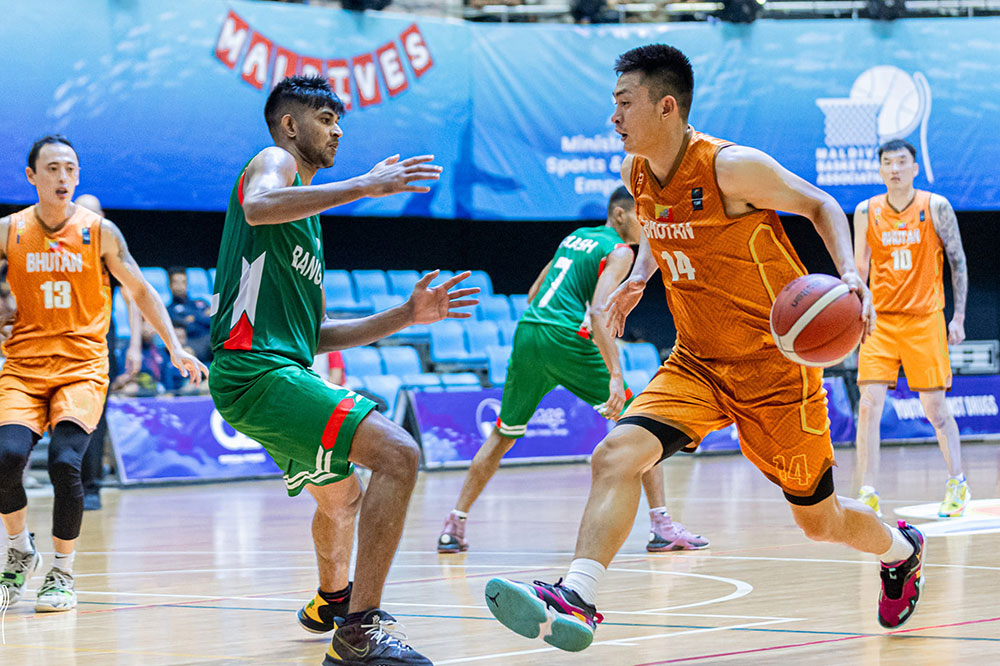In Bhutan, the people take pride in never having been colonized. One might thank the local deities or even the country’s strong defence. Although the Tibetans invaded in the 17th century and the British tried to colonize the country, Bhutan has remained independent, thanks to the protection of our deities, and the impenetrable defence provided by our great Kings and our strong mountains. The recent victory of the Dragon Boys in the 5 Nations Basketball Championship held in the Maldives once again proves that, despite being a tiny country, we are protected and our defence remains strong.
On June 12th, the 14 players and coaches flew to the Maldives. Facebook comments were filled with good luck messages, and a few fans shared posts of the boys at the airport. Winning was never expected. How could a country with just over 700,000 people compete against countries with up to 169 million people! Making it to the next round would be a blessing in itself.
The first game against Nepal began, and the country rejoiced in Bhutan’s first win. With a score of 61-55, Bhutan demonstrated great defence and ngagey (competent). Riding high on this victory and after two intense months of training (it’s interesting to note that all the boys on the team had never received such formal training before, besides some training in school and pick-up games), the Dragon Boys defeated the Maldives with a score of 60-50.
However, when facing Bangladesh, both defence and offence weakened, and panic was visible in the players’ eyes. Bangladesh, with its population of over 169 million, had physically larger players than the ones our team was accustomed to.
Nevertheless, they put up a fight but lost to Bangladesh with a score of 53-61. The boys then faced a crushing defeat against Pakistan with a score of 53-76.
After two wins and two losses, the path to victory seemed unclear. However, it was clear that everyone still held hope for a win, with some even placing sports bets on betting apps. The semi-final against Nepal was an anxiety-inducing game, with the scores neck and neck until the last few seconds. Just as Nepal gained control of the last rebound, the ball slipped out of a player’s hand and was caught by Sonam Jattu, who scored the winning buzzer-beater. After this major win in the semi-finals, the entire country came together to watch the finals against Bangladesh. Bhutanese around the world gathered around TVs, phones, and laptops. The country came together sharing cheers, screams, panic, and adrenaline.
The defence remained tight, and the players improved their offence, but after a 20-point lead, Bangladesh suddenly caught up. The Dragon Boys appeared to be heading towards defeat, and with 14 seconds left on the clock, Bangladesh received two free throws. Despite the few seconds remaining and the looming possibility of a loss, the breathless players displayed even more determination and managed to score an “and-one,” leading Bhutan to a final, unbelievable victory.
It’s incredible to think how such a small nation, with just 3 basketball courts in the capital, where players need to make phone calls to schedule a pick-up game and pay per game, was able to achieve such an amazing victory against giants. With this win, we are able to witness the pure, raw talent and ngagey that flows through our Himalayan bodies and minds. With a strong coach and a few months of team practice, we triumphed against countries with talent pools more than a hundred and fifty times larger than ours. Once again, one might say our deities carried us to victory, and that our ngagey makes our defence so strong. It may be that both of these are important factors.
This victory may also offer us deeper insights. As the smallest country in the region, landlocked, mountainous, and new to democracy, we, have many unique challenges ahead, just as our basketball team did in this tournament. In the face of such an uncertain world, perhaps our national strategic advantage could be similar to these basketballers: an ability to work together as a team, united, a willingness to put our most talented and meritorious people in “positions of impact” and finally, perhaps most challenging, to believe that our youth, when given the right supports, encouragements and mentorship, can lead us to a positive future that most could not have imagined possible.
It is realizations like this that are the most profound reasons we have to be grateful to this team. In their achievements, they have given us more than national pride. They have opened our minds to new possibilities and strategies for our nation’s future.
Contributed by
Pemma K. Lhazin
Endicott College, Boston


